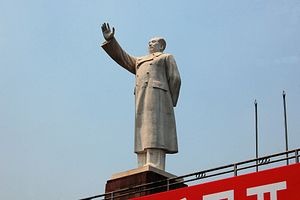This year has been off to a gloomy start for Chinese Communist Party (CCP) members. The harshest disciplinary code since the time of Mao, the Disciplinary Code of the Chinese Communist Party 中国共产党纪律处分条例 (“The Code”) came into effect on January 1, 2016. It threatens all Party members, regardless of rank, with dreadful punishments. The list of offenses ranges from having an affair (Article 129) to extensive overseas visits (Article 98: 1). All warrant the attention of the Internal Supervision Regulation Committee 纪律检查委员会 (ISRC). Citing the words of certain current Party members, the disciplinary codes have now become “unbearable and inhumane,” echoing the darkest years of the Maoist era. Almost every Party member is now a potential suspect.
“No one is exempt from The Code.”
The code can be applied retroactively to cases that date from decades ago. The ISRC’s motto has shifted from “serving the people” into “no official, retired or not, can escape inspection [for corruption].” This post factum approach has left many Party members distraught. Some of the acts now banned by the Code were gray areas in the old days. But the current anti-corruption campaign is a hunt which often focuses on the past. For example, the most recent investigations in Heilongjiang province focus on a corruption probe from 15 years ago. Bo Zhiyue wrote in The Diplomat back in November last year that China’s Corruption Campaign marches on as more of the so-called tigers have fallen to intra-party inspections. Under the new Code, anyone could become a “tiger” or a “fly.” The aims of the anti-corruption campaign have drifted course from combating corruption to persecution.
The Code has greatly expanded the ISRC’s powers. Besides establishing a disciplinary committee in every state organization, the ISRC can now remove the official under question on the spot and have him or her sent to law-enforcement agencies, which are at the beck and call of the Party, before the workday is over. Though each case differs, interviews with several Party members suggest that the “arrest first, question later” tactic is striking terror in the hearts of the Party’s ranks. These investigations are also raising the status of the ISRC. Previously a relatively marginal institution, the ISRC is now at the pinnacle of its powers. It seems that under Chinese President Xi Jinping, the Party Code is far more potent than the law of the state.
Watershed
The new code marks a watershed in Communist China’s history. With the new code, Xi and his Chinese Communist Party are pursuing a path that preaches the old ideals of the pre-opening era. In essence, the Code is part of a revolutionary process where Xi is breaking with procedures initiated under Deng and continued by all his successors. Given that the Party controls the State, he is essentially creating a new political order, where Maoist practices and strong nationalism are returning, but in the context of a semi-market economy with limited property rights.
The Disciplinary Code of the Chinese Communist Party aims to raise the ethical level of Communist officials – not to combat corruption. But rather than increasing government transparency and efficiency, the current Chinese anti-corruption campaigns has resulted in inflicting widespread fear amongst the bureaucratic elites. For many, the Code is a grim reminder to the Maoist era, and it does not symbolize the coming of the New Normal. At the end of the day, the Code is first and foremost a political tool wielded by Xi to purge those whom he sees as hindering his goals.
Leo Lin is a student at George Washington University and was a summer researcher at the Institute of Contemporary Asian Studies at Temple University Japan.

































